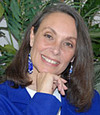It took me a lot of years to figure this one out. I grew up in a family that practiced cynicism like a religion. Nothing was exempt from our familial cynical eye. Anything that wasn’t part of our family’s dogma was suspect and therefore, frequently ridiculed during the family meal or late night discussions.
I thought cynicism was a normal part of life. It seemed to be a family practice that had been handed down several generations, and was so natural that it didn’t occur to me to question it until I went to college to become a special education teacher and later, as I delved more deeply into my physical healing. I discovered that positive thoughts, feelings, and expressions were far more effective with my students and in reinforcing my healing choices.
Cynicism has a way of presuming, “I’m right and you are wrong.” It is full of negativity that is harmful to the people or events you are being cynical about and it is toxic to you when you are one being cynical. Here is the deal. If you are being negative about someone else or something else, you are in the negative energy.
It is completely possible to question or consider the validity or veracity of something or someone without being cynical and therefore, negatively critical. I gave up on constructive criticism years ago, because I think the concept begets negativity and cynicism, and ultimately that isn’t constructive. You create a toxic environment for yourself and others when you are being cynical and disease gets fed in a toxic environment.
Let’s say that you just started a new healing therapy and it is not entirely comfortable for you to incorporate into your life. It requires some significant change, so you complain about all the ways in which you must adjust your habits and your life. How much benefit can you derive from the therapy if you surround it with negative thoughts and feeling? It sets up a breeding ground where part of your psyche has permission to sabotage your efforts. In very little time, you are likely to discover that the therapy you have adopted is not working well for you, so you have cause to give up on it and look for something else.
If, on the other hand, you recognize that you are going to need to make some significant changes and you do so willingly with a positive disposition, your choice becomes an active commitment to your well being, which your psyche recognizes as positive action on behalf of wellness. Even if the choice is not easy to implement immediately, your commitment and positive attitude are speaking to your subconscious. This creates an environment where your entire subconscious and conscious mind can align in the direction of your healing.
After years of dedicated, personal self-healing, and having observed hundreds of people in their healing process, I discovered that the negativity of cynicism has no place in the healing journey. Cynicism is a way of saying that you and others are never good enough. It is like saying the Divine presence in each person isn’t living up to your expectation. How can you accept Divine intervention in your healing if you are criticizing what the Divine brings into your life? When I finally realized this, I stopped being cynical and the healing had space in which to emerge. I was finally really trusting.
People heal when they are positively focused with love and clear intention to heal. They release themselves from the bondage of their anger and frustration, into the peaceful inner spaces that allow healing to occur. If I had known that when I was growing up, I might never have adopted the habit; however, as an adult recognizing its harmful nature, life and healing has been a lot easier without the limitations and toxicity of cynicism.
Misa Hopkins is the author of the best-selling book, “The Root of All Healing: 7 Steps to Healing Anything”, which has been named the first-aid handbook for the new 21st Century consciousness. She is also Spiritual Director and founder of New Dream Foundation, a non-profit organization dedicated to awakening through the sacred feminine. With over 30 years of teaching and training experience, including teaching hundreds of healers, and now as a spiritual counselor, Hopkins is an astute observer of human motivation and potential. Her observations about the healing progress of her clients, students and friends, and her own miraculous healings led her to ground-breaking conclusions about why people remain ill, even when they are trying to become well. Hopkins recognized that illness may actually meet unconscious needs you aren’t even aware exist. In her book, workshops and articles, she provides insights about how to break through the limits of illness to experience the freedom and joy of wellness.

Post new comment
Please Register or Login to post new comment.